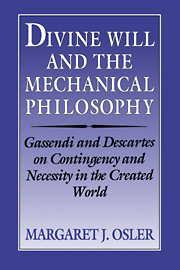 Divine Will and the Mechanical Philosophy
Divine Will and the Mechanical Philosophy Book contents
- Frontmatter
- Contents
- Acknowledgments
- Introduction
- Part I Theology and the philosophy of nature
- 1 Divine power and divine will in the Middle Ages: Historical and conceptual background
- 2 Baptizing Epicurean philosophy: Gassendi on divine will and the philosophy of nature
- 3 Providence and human freedom in Christian Epicureanism: Gassendi on fortune, fate, and divination
- 4 Theology, metaphysics, and epistemology: Gassendi's “science of appearances”
- 5 Eternal truths and the laws of nature: The theological foundations of Descartes' philosophy of nature
- 6 Gassendi and Descartes in conflict
- Part II The mechanical philosophy and the formation of scientific styles
- Bibliography
- Index
6 - Gassendi and Descartes in conflict
Published online by Cambridge University Press: 11 September 2009
- Frontmatter
- Contents
- Acknowledgments
- Introduction
- Part I Theology and the philosophy of nature
- 1 Divine power and divine will in the Middle Ages: Historical and conceptual background
- 2 Baptizing Epicurean philosophy: Gassendi on divine will and the philosophy of nature
- 3 Providence and human freedom in Christian Epicureanism: Gassendi on fortune, fate, and divination
- 4 Theology, metaphysics, and epistemology: Gassendi's “science of appearances”
- 5 Eternal truths and the laws of nature: The theological foundations of Descartes' philosophy of nature
- 6 Gassendi and Descartes in conflict
- Part II The mechanical philosophy and the formation of scientific styles
- Bibliography
- Index
Summary
When … I imagine a triangle, even if perhaps no such figure exists, or has ever existed, anywhere outside my thought, there is still a determinate nature, or essence, or form of the triangle which is immutable and eternal, and not invented by me or dependent on my mind.
René Descartes, MeditationsIt is hard to agree that there exists some immutable and eternal nature other than [that of] omnipotent God.
Pierre Gassendi, Disquisitio metaphysicaPrior to the publication of the Meditations in 1641, Descartes asked his friend and correspondent Marin Mersenne to circulate the manuscript for comment and criticism among a number of philosophers, including his fellow mechanical philosophers, Hobbes and Gassendi. These comments and Descartes' subsequent responses, were published as a lengthy appendix to the Meditations, the “Objections and Replies.” Despite the fact that Gassendi and Descartes shared a strong anti-Aristotelian sentiment, a consuming interest in natural philosophy, and a dedication to the establishment of a new, mechanical philosophy of nature, their arguments in the “Objections and Replies,” later amplified in Gassendi's Disquisitio metaphysica (1644), were heated, to say the least. This controversy signaled a major rift between the two founding fathers of the mechanical philosophy. What was really at stake between them?
Their conflict can be understood as yet one more episode in the ongoing confrontation between the Judeo-Christian belief in divine omnipotence and the classical Greek preoccupation with the intelligibility of nature.
- Type
- Chapter
- Information
- Divine Will and the Mechanical PhilosophyGassendi and Descartes on Contingency and Necessity in the Created World, pp. 153 - 168Publisher: Cambridge University PressPrint publication year: 1994


